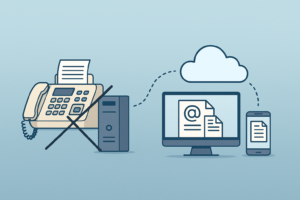Faxing was once the pinnacle of technological innovation. People marveled at the ability to feed a piece of paper into a machine in one part of the world and be able to have someone hundred of miles away read the exact same document. It was revolutionary, and it made a major impact on the business sector.
However, the world has since discovered the internet and more digital forms of communication, and legacy fax systems have fallen by the wayside for most enterprises. That said, certain organizations have had to continue to rely on this outdated piece of technology for multiple reasons.
Your industry may have certain regulations regarding the transfer of private information, but that doesn't mean you're stuck with legacy fax machines forever. In fact, there's another technology that can do everything these devices can and more. IP-based fax is a revolutionary way of ensuring the right person gets the record he or she needs to get the job done, and it’s completely changing how some companies do business. To that end, let’s take a look at the top three reasons you should consider making the switch from legacy fax systems to corporate cloud fax solutions like FoIP.
1. Telecom companies are moving away from copper phone lines
Clearly, legacy fax machines just aren't as useful as they used to be. In fact, copper phone lines in general aren't aging very well. The infrastructure in the U.S. is incredibly old and it's beginning to fall apart. On top of that, people are increasingly moving away from landlines in favor of cellphones, which is only speeding up this process.
What's more, telecom companies are already beginning to see the writing on the wall. They know people don't use the copper phone lines as much as they used to, and their need to focus on fiber and wireless technologies is forcing these organizations to simply abandon this older form of communication.
"Telecom companies are beginning to see the writing on the wall."
According to Bob Fernandez of the Philadelphia Inquirer, around 1.1 million Verizon customers in Pennsylvania have had their copper phone line service changed to fiber as part of an initiative the company has called "Fiber Is the Only Fix." This makes a lot of sense for Verizon, as fiber is a lot more "future proof," or able to adapt to the constantly changing nature of modern technology. In fact, calling Verizon due to poor service twice in 18 months will put them on the list for an upgrade.
The reason behind all of this is that the copper phone lines in the U.S. aren't long for this world. Verizon is using this policy of changing to fiber after two service calls because they aren't 100 percent sure where all the damage to the infrastructure lies. Finding these broken down copper lines and fixing them would take quite a lot of money, and Verizon just isn't willing to spend anything on a dying technology.
Although this has a lot of repercussions for many Americans, one of the biggest is the fact that legacy fax machines won't be able to function properly very soon. Businesses that rely on these devices are going to have to come up with a backup plan, and they need to move quickly.
For many, the perfect solution lies in a switch to corporate eFax solutions. This service can allow companies to continue to rely on the security of legacy fax machines that they've come to know and love, without the hassle of dealing with a broken infrastructure. What's more, customers and other partners won't have to change anything to continue to communicate with a FoIP system, thereby ensuring such a switch won't rock the boat too much.
2. Legacy fax systems are inefficient and expensive
Anyone who's had to work with a legacy fax machine on an extended timeline knows how frustratingly inefficient these devices are. To begin, they rely on paper documents, something the modern office culture is rapidly moving away from. This means that anytime someone needs to refer to an older record, they need to search through massive stacks of folders until they finally stumble upon the one they need.
On top of this, legacy fax systems require a lot of care and attention. Someone needs to constantly refill the paper tray, which can certainly add up over a long period of time. What's more, the companies that use these machines have generally been doing so for a long time. This means many of these devices are extremely old and often need repairs or to be replaced.

IP-based fax completely solves these problems. This technology keeps a digital archive of all faxes, making searching for the document you need a cake walk. What's more, FoIP systems don't require paper refills and they don't have nearly the same maintenance costs as legacy fax machines.
3. Employees need to be able to work wherever, whenever
The working world just isn't what it used to be. Not too long ago, the idea of an employee getting work done outside the office on a consistent basis was laughable. All the resources needed to get a job done were contained within the facility, and moving a massive amount of paper files home and back again simply wasn't feasible.
"The working world just isn't what it used to be."
That said, times have changed. One of the biggest developments behind this shift has been the mass adoption of the smartphone. Computers used to be expensive behemoths, but now just about every employee has one in his or her pocket. This has spawned some revolutionary changes in how workers complete tasks.
Chief among these is the bring-your-own-device craze that's taking the world by storm. This is the idea that workers should be allowed to use their own devices – smartphones included – in order to get work done. Employees can do everything from email a client back while on the train to reading important work-related documents on the go. In fact, a survey from Tech Pro Research found that nearly three-quarters of companies either have a BYOD policy or plan to implement one soon.
On top of this, the ability to exchange information quickly and effectively over the internet has created a massive demand from employees for the right to work at home. According to Global Workplace Analytics, around 66 percent of workers like the idea of telecommuting. In fact, 36 percent of workers would rather have the ability to work from home than get a raise.
However, this trend also has some major implications for employers as well. Around 95 percent of executives believe remote working to have a "high impact" on the company's ability to keep employees for extended periods of time. Businesses looking to keep retention rates high are increasingly seeing the benefits of telecommuting.
So what does all of this have to do with faxing? Well, legacy fax machines negate all the benefits of both BYOD and remote working. Employees have to stay in the office in order to read a message printed on one of these gadgets, which means they can't reply whenever or wherever. FoIP, on the other hand, allows these people to receive messages directly to their smartphone, which means they can get the information they need to do the job right regardless of where they're working.
Enhance enterprise communication, collaboration and compliance efforts with a proven FoIP solution from FaxCore. Contact FaxCore today to learn more about their 'Partly-Cloudy' fax solutions.




